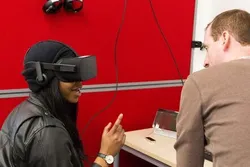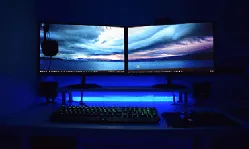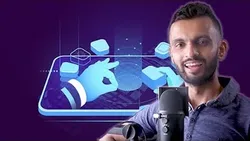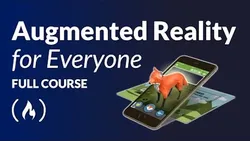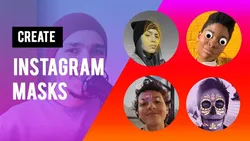Free Online Augmented Reality Courses and Certifications 2024
Augmented Reality (AR) is a technology that combines the physical world with the digital world, allowing users to interact with virtual objects in a real-world environment. It has become increasingly popular in the field of programming, as it allows developers to create immersive learning experiences and online courses. AR can be used to enhance knowledge and understanding of complex topics, making it an invaluable tool for programming students.
Popular Courses
This course is designed for Unity game engine users who want to learn how to create an engaging and immersive augmented reality (AR) maze game. Through this course, you will learn how to design and build a 3D maze, control a ball navigating through the maze using physics, and make the experience available in augmented reality. By the end of the course, you will have created an interactive AR maze game that you can share and play with others. Suitable for artists, designers, and game developers who want to enhance their art practice with AR technology, this course is the perfect way to create interactive and immersive AR experiences.
Learn MoreDiscover the fundamentals of How to Make and Sell Your First Immersive Experience
Learn MoreThis advanced Spark AR Studio course teaches students how to use advanced skills and techniques to create and design augmented reality (AR) filters and use custom AR. Students will learn how to use Spark AR tools and effects to create unique and engaging AR experiences. They will also gain an understanding of the fundamentals of AR development.
Learn MoreSpark AR Studio is a powerful augmented reality platform for Mac and Windows that enables users to create their own AR effects and filters. With Spark AR Studio, users can create anything from simple graphics to complex 3D worlds, and share their creations with the world. It's an easy-to-use platform that allows anyone to create amazing AR experiences.
Learn MoreThis advanced Spark AR Studio course is designed to help learners build on their existing skills and techniques. Through this course, learners will be able to further their Spark AR journey and gain the knowledge and confidence to create their own unique effects and tools.
Learn MoreThis course provides an introduction to Spark AR Studio, teaching the fundamentals of creating and designing with the platform. Students will learn how to create effects for themselves or others, as well as how to use the tools and features of Spark AR Studio. By the end of the course, students will have the skills to start their own Spark AR journey.
Learn MoreThis Augmented Reality Development course provides an introduction to the Unity ARKit and ARCore SDKs, as well as the AR Foundation. It covers topics such as setting up the SDKs, building to Android, and creating AR experiences in Unity. Learners will gain the skills necessary to develop augmented reality applications.
Learn MoreThis course provides an introduction to Manomotion, a technology that enables users to create augmented reality applications using hand gestures. Participants will learn how to download, install and license Manomotion, as well as how to use the data structures and algorithms to create their own AR apps. With this course, users will gain the skills to create interactive and immersive experiences.
Learn MoreThis Augmented Reality Free Tutorial provides a step-by-step guide to downloading and installing Unity Hub and Editor, as well as how to create, position, rotate and scale game objects. It also covers adding physics components, creating prefabs and more. This comprehensive course is perfect for those looking to learn the basics of Augmented Reality.
Learn MoreThis course provides an introduction to Augmented Reality (AR) and how to use Unity and C# to create AR experiences. It covers topics such as installing Unity, Unity tutorials, C# basics, comments, variables, data types, type casting, operators, conditionals, loops, and more. Participants will gain the skills to create their own AR projects.
Learn MoreThis course provides an in-depth look at the ARCore technology and how to use it in Unity SDK to create 6 Augmented Reality apps. Learners will gain knowledge on the three technologies behind AR apps, how to install and set up Wikitude ARCore in Unity, and how to build and deploy their own AR apps.
Learn MoreThis course provides an in-depth look at Augmented Reality (AR). It covers the basics of AR, its growing market, and the introduction of Virtual Reality (VR). It also explores the potential of AR and VR in various industries, and how to create AR experiences. The course is designed to help learners understand the fundamentals of AR and its applications.
Learn MoreThis course is perfect for game developers who want to create and publish their own Multiplayer Augmented Reality (AR) Games. With the help of this course, you will learn the basics of Multiplayer AR game development, as well as how to use the top AR SDKs such as Google's ARCore and Apple's ARKit. You will also learn how to connect to Photon servers, join random rooms, write synchronization scripts, and more. With the help of this course, you can create and publish your own Multiplayer AR Games and be part of this new, awesome gaming platform. Join now and let's build together!
Learn MoreThis course provides an introduction to developing applications for Microsoft HoloLens, the world's first self-contained holographic computer. Learn how to create virtual and augmented reality applications for enterprise business and gaming. With this course, you will gain the skills to program the future and create amazing experiences with HoloLens.
Learn MoreThis course teaches users how to create their own Instagram masks using Spark AR Essentials. Participants will learn the basics of mask creation, from the initial concept to the final product. By the end of the course, users will have their own unique mask to share with their followers.
Learn MoreThis course provides an introduction to Spark AR Studio, a powerful tool for creating filters for Instagram and Facebook. Through easy-to-follow tutorials, users will learn how to create professional filters and start creating their own. With this course, users will be able to create their own filters for Instagram and Facebook.
Learn More Augmented Reality Courses
Career Trends
Career Prospects
| Average Salary | Position Overview
|
| Software Engineer | $141,847 per year
| Software engineering is a field within computer science that focuses on creating, designing, testing, and maintaining software applications. Professionals in this field utilize engineering principles and their expertise in programming languages to develop software solutions that meet the needs of end-users. |
| Test Engineer | $94, 497per year | Test Engineers are responsible for conducting comprehensive assessments of materials, procedures, and mechanical or electrical systems to guarantee that customers receive high-quality and operational products. They perform tests on different components and functionalities to pinpoint and rectify technical problems. |
| Production Engineer | $95,682 per year | Production Engineers are responsible for overseeing the planning, direction, and coordination of the design, construction, modification, ongoing operation, and maintenance of equipment and machinery within industrial plants. They also manage and plan manufacturing activities to ensure efficient and effective production processes. |
| Senior Software Engineering Manager | $201,015 per year | A Senior Software Engineering Manager is responsible for supervising software development and providing guidance to the team in achieving project milestones. Their duties include mentoring, training, and instructing junior developers to ensure that the team operates efficiently and produces high-quality work. |
| Engineering Manager | $190,558 per year | An Engineering Manager is responsible for a range of duties, including project planning, design, and supervision, as well as financial management and the oversight of one or more engineering teams. As an Engineering Manager advances in their career, they may oversee multiple teams and managers in their role as a technical leader. |
Educational Paths
1. Computer Science Degree: Pursuing a degree in computer science can provide a strong foundation in programming and software development, which are key skills for working with Augmented Reality.
2. Online Courses: Many online learning platforms offer courses in Augmented Reality development, such as Udemy, Coursera, and LinkedIn Learning.
3. Augmented Reality Bootcamps: Bootcamps are immersive, short-term programs that provide hands-on training in Augmented Reality development. Some popular options include Reality Composer Academy and the AR/VR Development Bootcamp by Circuit Stream.
4. Certifications: Augmented Reality certifications, such as the Unity Certified Associate and the AR/VR Developer Certification by Unity, can demonstrate proficiency and validate skills in the field.
Frequently Asked Questions and Answers
Q1: What is a mixed and augmented reality (MAR) course, and what topics are typically covered in it?
This Mixed and Augmented Reality (MAR) course will provide you with the skills and knowledge to create immersive and interactive mobile applications. You'll learn how to use MAR technologies to rapidly and easily prototype three different applications for Android smartphones and tablets, even with no prior coding experience. Through hands-on projects, you'll gain a comprehensive understanding of the fundamentals of MAR development, from creating 3D models to developing interactive user interfaces. By the end of the course, you'll have the skills to create engaging and innovative mobile applications that will captivate your users.
Q2: How much does it cost to learn augmented reality, and what are the best resources to learn it?
The cost of learning augmented reality depends on the platform you choose. For example, the Spark AR platform is free and open to any learners and future entrepreneurs. After completing the course, you can share your certificate with prospective employers and your professional network on LinkedIn. There are no prerequisites for learning Spark AR, so anyone can get started with augmented reality development.
Q3: What is difference between AR and VR?
AR utilizes a real-world environment, whereas VR operates within a fully virtual realm. Users of AR have the ability to manipulate their presence within the actual world, whereas VR users are subject to the control of the system. The utilization of a headset device is necessary for VR, whereas AR can be accessed simply through a smartphone.
Q4: What Augmented Reality courses can I find on AZ Class?
On this page, we have collected free or certified 78 Augmented Reality online courses from various platforms. The list currently only displays up to 50 items. If you have other needs, please contact us.
Q5: Can I learn Augmented Reality for free?
Yes, If you don’t know Augmented Reality, we recommend that you try free online courses, some of which offer certification (please refer to the latest list on the webpage as the standard). Wish you a good online learning experience!

